 |
Muzsikás / Sebestyén Márta
Hungary
|
|
|
|
|
|
|
| |
Live at Liszt Academy
(A Zeneakadémián)
|
folk |
|
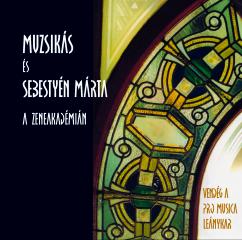 Muzsikás Ensemble and Márta Sebestyén regularly appear at Budapest Spring Festival since 1999. This album is a compilation of these concerts, mainly based on their concert in 2003 where they performed together with Pro Musica Choir.
Muzsikás Ensemble and Márta Sebestyén regularly appear at Budapest Spring Festival since 1999. This album is a compilation of these concerts, mainly based on their concert in 2003 where they performed together with Pro Musica Choir.
"Most of us began our music training with the Kodály method. From that time on, music has been a significant part of our lives. It has been our dream to convey what it is, that traditional folk music, Kodály and Bartók's music means to us. So, starting in 1999, we gave a concert each spring at the Academy of Music in Budapest presenting another side of Kodály and Bartók's work.
Performing also at these concerts as our guests were violinist Alexander Balanescu, cellist Roel Dieltiens, pianist Jenő Jando, the Keller Quartet and the Pro Musica choir directed by Dénes Szabó. At these concerts, classical music and folk music were heard alternatively, linked to eachother, complementing one other and occasionally at the same time. We also invited traditional village musicians to play with us; Árpad Tóni, cimbalom player from the Marosszék area of Transylvania and János Kovács, tambura plyaer from village of Bogyiszló in South-Central Hungary. We selected the material for this record from recordings made at the concerts, inevitably leaving out many pieces dear to our hearts. The 2003 concert with the Pro Musica Choir takes a central role. We hope to give back the atmosphere of the concerts. Such moments for example as when a Bartók or Kodály piece organically connects with a folk song, religious folk song or traditional instrumental music. Most of the selections of this record present the traditional material behind a particular Bartók or Kodály work." - MUZSIKÁS
Mihály Sipos - violin
László Porteleki - violin, koboz
Péter Éri - viola, kaval
Dániel Hamar - contrabass
Márta Sebestyén - voice
Árpád Toni - dulcimer
Pro Musica Girly Choir dir. Dénes Szabó
Zoltán Farkas - dance, drum, percussion
Ildikó Tóth - dance
Márton Éri - viola
| 1. | Csárdás és szökő Csávásról / Dances of Csávás | | 2. | Marosszéki táncdallamok / Marosszék dance melodies | | 3. | A kállai kettős / The kálló couple dance | | 4. | Kodály Zoltán: Hegyi éjszakák 1. / Zoltán Kodály: Mountain nights | | 5. | Kyrie Moldvából / Kyrie from Moldavia | | 6. | Szól a kakas már / The rooster is crowing | | 7. | Kodály Zoltán: Zöld erdőben / Zoltán Kodály: In the green wood | | 8. | Pe loc / Pe loc | | 9. | Invirtita / Invirtita | | 10. | A Bakonyba’ lakom / I live in the Bakony | | 11. | Bartók Béla: Senkim a világon / Béla Bartók: Song of loneliness | | 12. | Édes Gergelem / My sweet Gregory | | 13. | Szép Fejér Pakulár / Ballad of the murdered shepherd | | 14. | Mezőségi Táncrend / Dances of Mezőség | | 15. | Ének Szent Istvánhoz / Song to Saint Stephen | | 16. | Kodály Zoltán: Ének Szent Istán királyhoz / Zoltán Kodály: Hymn to St. Stephen |
|
|
Comments
(0 messages) |
|
MU 005 |
CD |
2003 |
0.00
€ |
 |
|
|
|
|
|
|
|
|
|
|
| |
The Lost Jewish Music of Transylvania
(Szól a kakas már)
|
folk |
|
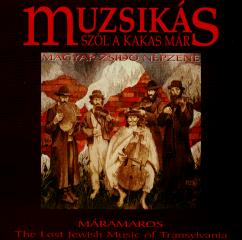 Maramaros was a Jewish community in Transylvania that had a rich musical heritage prior to the Second World War. As a result of the Holocaust, though, not one of the town's musicians returned from deportation. Enter Muzsikas. Hungarian musicologist Zoltan Simon met with the band, offering them some unpublished transcriptions, which Muzsikas arranged and performed. Then they took their research a step farther, tracking down Gypsy musicians who played for Jews before the War. Their task was well-defined: to find the link between Hungarian and Jewish folk music. The disc stands as lovely, haunting proof of that discovery.
Maramaros was a Jewish community in Transylvania that had a rich musical heritage prior to the Second World War. As a result of the Holocaust, though, not one of the town's musicians returned from deportation. Enter Muzsikas. Hungarian musicologist Zoltan Simon met with the band, offering them some unpublished transcriptions, which Muzsikas arranged and performed. Then they took their research a step farther, tracking down Gypsy musicians who played for Jews before the War. Their task was well-defined: to find the link between Hungarian and Jewish folk music. The disc stands as lovely, haunting proof of that discovery.
"In 1988, we were invited to play at the opening of a photo exhibition. Since the theme of the exhibition was the life of religious Jews, we thought it appropriate to play some Jewish pieces. During our field tips, we had already encountered pieces wich were known as "Jewish csárdás" and had also heard of "Jewish tuning", but paid no special attnetion to these phenomena. However, after this concert, we became involved with Jewish instrumental music. We found encouragement and guidance in the teachings of Zoltán Simon. He encouraged us to continue to search for the remnants of Jewish instrumental music. He supposed that musicians who used to play for Jews before the war could still be found. "Your task is to find the link between Hungarian and Jewish folk music" - he said to us. That is how we started our journey in the search of Jewish folk music. The fruit of this search is this record."
Mihály Sipos - violin
Sándor Csoóri - violin, viola, guitar
Péter Éri - viola
Dániel Hamar - contrabass, small hammer dulcimer
Guest:
Márta Sebestyén - vocals
with:
Csaba Ökrös - violin
Gheorghe Covaci - violin
Árpád Toni - cimbalom
Gheorghe Florea - "zongura"
Ioan Florea - drums
| 1. | Chasid lakodalmi táncok / Hasid wedding dances | | 2. | Szól a kakas már / The rooster is crowing | | 3. | Máramarosszigeti tánc / Dance from maramures | | 4. | "Keserves" / "Lamenting song" | | 5. | Áni Máámin / Áni Máámin | | 6. | Most jövök Gyuláról / I have just coming from Gyula | | 7. | Szombateste búcsúztató / Farewell to saturday evening | | 8. | Szászrégeni zsidó tánc / Jewish dance from Szászrégen | | 9. | Hat Ein Jud Ein Weibele / Hat Ein Jid Ein Weibele | | 10. | Széki zsidó csárdások / Jewish csárdás series from Szék | | 11. | Chasid tánc / Hassid dances | | 12. | Menyasszonybúcsúztató / The greeting of the bride | | 13. | Chanukka gyertyagyújtás / "Haneros halelu" | | 14. | Töredék / Farewell to the guests |
|
|
Comments
(0 messages) |
|
MU 002 |
CD |
2000 |
0.00
€ |
 |
|
|
|
|
|
|
|
|
|
|
| |
|
Bartók album
|
folk |
|
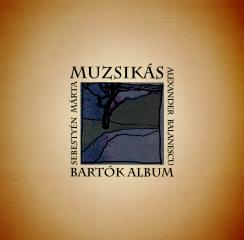 The CD of the Muzsikás is an exploration of the close relationship between the composer Béla Bartók and folk music. It is an exploration seen through the eyes of the group. Bartók was one of the most important and influential musical personalities of the century. The majority of his work exhibit the influence of folk music. While he forged a twentieth century modern musical language, he also used melodies, melodic shapes, harmonies and rhythms which he encounted on his own collecting trips. Almost every melody on Muzsikás’ Bartók album was originally collected by Bartók himself. He also wrote these melodies down and used them in his own works. On the album the Romanian born violin virtuoso Alexander Balanescu and Márta Sebestyén who has a superb knowledge of ancient folk singing feature.
The CD of the Muzsikás is an exploration of the close relationship between the composer Béla Bartók and folk music. It is an exploration seen through the eyes of the group. Bartók was one of the most important and influential musical personalities of the century. The majority of his work exhibit the influence of folk music. While he forged a twentieth century modern musical language, he also used melodies, melodic shapes, harmonies and rhythms which he encounted on his own collecting trips. Almost every melody on Muzsikás’ Bartók album was originally collected by Bartók himself. He also wrote these melodies down and used them in his own works. On the album the Romanian born violin virtuoso Alexander Balanescu and Márta Sebestyén who has a superb knowledge of ancient folk singing feature.
Mihály Sipos - violin
Péter Éri - viola, violin, kaval, guitar, percussion
László Porteleki - violin
Dániel Hamar - double bass, little cimbalom, beat gardon, percussion
Featuring:
Márta Sebestyén - voice
Balanescu Alexander - violin
János Köles Kovács - tambur
Zoltán Juhász - long flute
Márton Éri - cello
Zoltán Porteleki - cimbalom
Ildikó Tóth - dance
Zoltán Farkas - beat gardon, drum, dance
| 1. | Elindultam a hazámból / I left my homeland | | 2. | Mérai lassú csárdás és szapora / Dances of Kalotaszeg | | 3. | Pásztornóták hosszúfurulyán / Long flute melodies | | 4. | Forgácskóti legényes / Lads' dance called "Forgácskúti" | | 5. | Pejparipám rézpatkója / The shoe of my horse | | 6. | Bartók Béla: 28. duó "Bánkódás" / Béla Bartók: Duo No 28. "Sorrow" | | 7. | Bonchidai ritka magyar / Slow dance of Lads' from Bonchida | | 8. | Porondos víz martján / At the waterside | | 9. | Kanásztáncok két hegedűn / Swinheards' dance | | 10. | Jocul barbatesc | | 11. | Bartók Béla: 32. duó "Máramarosi tánc" / Béla Bartók: Duo No 32 "Dances of Máramaros" | | 12. | Máramarosi táncok / Dances of Máramaros | | 13. | Botos tánc "Jocul cu bata" / Bota | | 14. | Torontáli táncok / Dances of Torontál | | 15. | Ardeleana | | 16. | Bartók Béla: 44. duó "Erdélyi tánc" / Béla Bartók: Duo No 44. "Transylvanian Dance" | | 17. | Füzesi ritka magyar / Lads' dance from Füzes | | 18. | Pe loc | | 19. | Magyarbecei öreges csárdások / Music of Magyarbece | | 20. | Dunántúli ugrósok / Transdanubian "ugrós" | | 21. | Dunántúli friss csárdások / Fast csárdás | | 22. | A temető kapu / Churchyard gate |
|
|
Comments
(0 messages) |
|
MU 001 |
CD |
1998 |
0.00
€ |
 |
|
|
|
|
|
|
|
|
|
|
| |
|
Nem arról hajnallik, amerről hajnallott
|
folk |
|
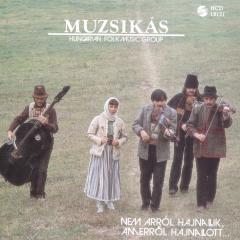
| 1. | Rabnóta - Nem arról hajnallik | | 2. | Eddig vendég | | 3. | Azt gondoltam eső esik | | 4. | Hidegen fújnak a szelek | | 5. | Bújdosódal - Fordulj kedves lovam | | 6. | Repülj madár, repülj | | 7. | Régen volt, soká lesz | | 8. | Szerelem, szerelem | | 9. | Én csak azt csodálom | | 10. | Elment a madárka - Martin György emlékére |
|
|
Comments
(0 messages) |
|
HCD 18121 |
CD |
1993 |
0.00
€ |
 |
|
|
|
|
|
|
|
|
|
|
| |
|
Dúdoltam én
|
folk |
|
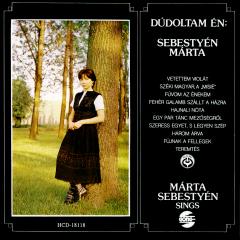
| 1. | Vetettem violát | | 2. | Széki magyar, a Misié | | 3. | Fúvom az énekem | | 4. | Fehér galamb szállt a házra | | 5. | Hajnali nóta | | 6. | Egy pár tánc Mezőségről | | 7. | Szeress egyet, s legyen szép | | 8. | Három árva | | 9. | Fújnak a fellegek | | 10. | Teremtés |
|
|
Comments
(0 messages) |
|
HCD 18118 |
CD |
1990 |
0.00
€ |
 |
|
|
|
|
|
|
|
|
